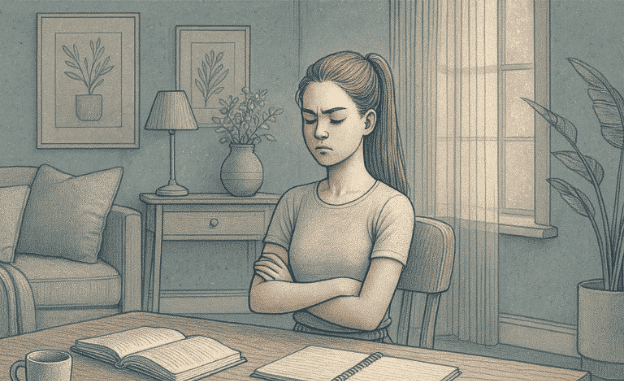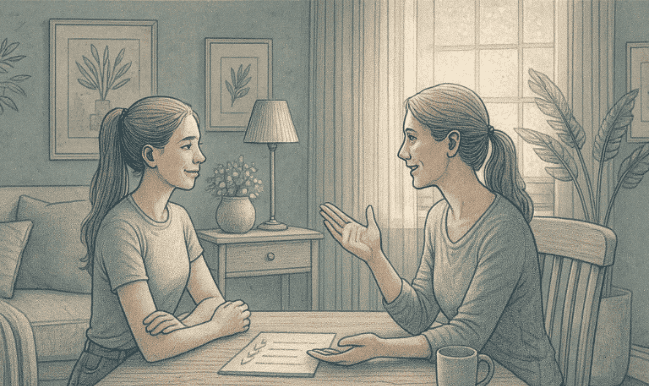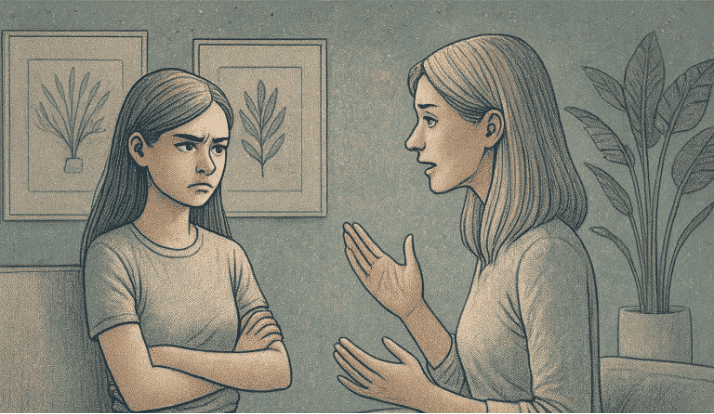Key Takeaways
- Oppositional defiant disorder (ODD) in teen girls often manifests differently than in boys, with more relational aggression, passive resistance, and verbal defiance rather than physical aggression, leading to underdiagnosis.
- Traditional punitive discipline approaches typically escalate conflict with ODD, while positive reinforcement, clear expectations, natural consequences, and de-escalation techniques create more effective behavioral change.
- Therapy-based treatments, including Parent Management Training, Cognitive-Behavioral Therapy (CBT), and family therapy, help girls develop emotional regulation skills while improving parent-teen relationships.
- Mission Prep’s specialized programs for adolescents ages 12–17 integrate evidence-based behavioral therapies with family support to address ODD and related challenges through residential, outpatient, and telehealth services.
Understanding Oppositional Defiant Disorder in Teen Girls
Oppositional defiant disorder, or ODD, shows up as ongoing patterns of anger, defiance, and hostility toward authority. While it affects both boys and girls, it often looks different in teen girls, which can make it harder to spot and treat early.
Instead of physical outbursts, girls are more likely to push back through words and relationships. This might look like manipulation, social exclusion, passive resistance, or sharp verbal attacks that don’t always seem like signs of a disorder at first.
These behaviors go far beyond the occasional teenage rebellion. They happen often, create real strain on families, impact school performance, and complicate friendships. Many girls with ODD wrestle with overwhelming emotions, struggle to take responsibility, and shift blame onto others.
Recognizing ODD as a true mental health condition helps families respond with compassion instead of judgment. The behaviors stem from challenges with regulating emotions, controlling impulses, and handling frustration; areas where the right treatment and support can make a lasting difference.
Mission Prep Healthcare specializes in mental health treatment for teens aged 12-17, offering residential and outpatient programs for anxiety, depression, trauma, and mood disorders. Our therapies include CBT, DBT, EMDR, and TMS, tailored to each adolescent’s needs.
With a structured, supportive environment, we integrate academic support and family involvement to promote lasting recovery. Our goal is to help teens build resilience and regain confidence in their future.
Recognizing the Signs of ODD in Adolescent Girls
Oppositional defiant disorder in teen girls manifests through distinctive behavioral patterns that differ from typical adolescent testing of boundaries. Recognizing these signs helps families seek appropriate support before patterns become deeply entrenched.
Frequent arguments with parents and authority figures represent a core feature of ODD. These aren’t occasional disagreements but persistent, intense conflicts that occur regularly and escalate quickly. Teen girls with ODD often seem to argue for the sake of arguing, becoming defensive even when approached calmly.
Active defiance of rules and requests appears as a consistent pattern. This includes refusing to comply with reasonable requests, deliberately doing things parents have asked them not to do, and finding ways to avoid or delay following household expectations. The defiance feels intentional and deliberate rather than simply forgetful or distracted.
Vindictive and spiteful behavior distinguishes ODD from typical teenage frustration. Girls with ODD may seek revenge for perceived slights, hold grudges for extended periods, and deliberately try to annoy or upset family members. This vindictiveness often seems disproportionate to the triggering situation.
Frequent anger and irritability characterize much of their emotional experience. These teens often seem easily annoyed, quick to lose their temper, and perpetually resentful or angry. The intensity and frequency of their anger exceeds normal teenage emotional fluctuations.
Blaming others for mistakes and misbehavior is another key pattern. Teen girls with ODD rarely take responsibility for their actions, instead attributing their behavior to others’ provocations or unfair treatment. They may genuinely believe others are at fault and become outraged when held accountable.
In girls specifically, ODD often includes relational aggression like spreading rumors, manipulating friendships, excluding others socially, and using relationships as weapons when angry. Passive-aggressive behaviors such as deliberate procrastination, “forgetting” important tasks, or doing things poorly on purpose also appear frequently.

Teen girls with ODD display persistent patterns of defiant, argumentative, and vindictive behavior that significantly impact family relationships and daily functioning.
Why Traditional Discipline Approaches Don’t Work
Many parents learn that standard discipline methods don’t just fail with ODD—they often make things worse. Harsh consequences tend to fuel more conflict instead of reducing it. When punishment becomes the focus, teens with ODD usually push back harder, turning the situation into a power struggle where the real issue gets lost.
For girls with ODD, intense emotions and poor impulse control are already part of the struggle. Traditional discipline overlooks these challenges and ends up punishing them for skills they haven’t fully developed. That leaves both sides frustrated without teaching healthier ways to cope.
Over time, this creates a cycle where most interactions feel negative. Parents brace for defiance, teens expect conflict, and both miss the chance to connect in ways that could actually support change.
Lectures and long explanations don’t work well either. In the heat of the moment, teens with ODD aren’t in a state to absorb reasoning. The more parents explain, the more material there is to argue over, which only stretches the conflict further.
Effective Discipline Strategies for ODD
Managing oppositional defiant disorder requires discipline approaches specifically designed to reduce conflict while still maintaining appropriate boundaries and expectations. These strategies focus on building cooperation rather than forcing compliance.
Positive reinforcement creates more powerful motivation than punishment for teens with ODD. This means actively noticing, acknowledging, and appreciating cooperative behavior, partial compliance, and effort toward improvement. Catching teens doing things right, even small things, helps shift the overall dynamic from negative to positive.
Clear, specific expectations delivered calmly prevent many conflicts. Rather than vague instructions like “clean your room,” effective requests specify exactly what needs to happen and when. Keeping instructions brief and matter-of-fact reduces opportunities for arguments.
Natural and logical consequences work better than arbitrary punishments. Natural consequences allow teens to experience the direct results of their choices without parent-imposed penalties. Logical consequences connect meaningfully to the behavior, teaching responsibility rather than creating resentment.
De-escalation techniques prevent conflicts from spiraling. This includes recognizing early signs of escalation, staying calm regardless of the teen’s emotional state, avoiding power struggles over minor issues, and giving everyone space to cool down before addressing problems. Parents learn to model the emotional regulation they want their teens to develop.
Offering limited choices provides appropriate autonomy while maintaining boundaries. Rather than demanding compliance, parents can present two acceptable options, allowing teens to exercise control within safe parameters.
Pick your battles strategically. Not every defiant behavior requires immediate confrontation. Prioritizing the most important rules and expectations while letting minor issues go reduces overall conflict and preserves energy for battles that truly matter.

Effective discipline strategies for ODD focus on positive reinforcement, clear expectations, natural consequences, and de-escalation rather than punitive approaches.
Therapy-Based Treatment Options
Professional treatment provides essential support for families dealing with oppositional defiant disorder. Evidence-based therapeutic approaches address both the teen’s behavioral patterns and the family dynamics that influence them.
Parent Management Training represents one of the most effective interventions for ODD. This approach teaches parents specific techniques for encouraging positive behavior, setting effective limits, and responding to defiance in ways that reduce conflict. Parents learn consistent, structured approaches that help teens develop better self-control and cooperation over time.
Cognitive-Behavioral Therapy (CBT) helps teen girls with ODD develop crucial emotional regulation and problem-solving skills. Through CBT, teens learn to recognize triggers for their anger, identify thought patterns that fuel defiance, and develop healthier ways of expressing frustration and managing conflicts. They practice communication skills, perspective-taking, and strategies for handling situations that typically provoke oppositional responses.
Dialectical Behavior Therapy (DBT) offers particularly valuable tools for teens who struggle with intense emotions. DBT teaches mindfulness, distress tolerance, emotion regulation, and interpersonal effectiveness skills that directly address the emotional dysregulation underlying much ODD behavior. These concrete skills give teens alternatives to defiant responses when feeling overwhelmed or upset.
Family therapy addresses relationship patterns and communication difficulties that maintain oppositional behavior. Sometimes family dynamics inadvertently reinforce defiance, and therapy helps everyone develop healthier ways of interacting. Family sessions provide space to rebuild trust, improve communication, and strengthen relationships damaged by ongoing conflict.
Individual therapy gives teen girls private space to explore underlying issues contributing to their oppositional behavior. Many girls with ODD struggle with anxiety, low self-esteem, trauma, or unmet emotional needs that fuel their defiance. Addressing these root causes supports lasting behavioral change.
Why Mission Prep’s Comprehensive Approach Works

Mission Prep’s home-style setting for teen ODD care, pairs CBT, DBT, PMT, and family therapy across residential, outpatient, and telehealth.
When oppositional defiant disorder requires professional intervention, Mission Prep Healthcare offers specialized programs that integrate evidence-based behavioral therapies with family support for lasting change.
Our programs serve adolescents ages 12 to 17 through residential, outpatient, and telehealth services designed specifically for behavioral and mental health challenges. We understand that ODD requires comprehensive treatment addressing not just defiant behaviors but underlying emotional regulation difficulties and family relationship patterns.
Our therapeutic approach combines Cognitive-Behavioral Therapy, Dialectical Behavior Therapy, and family therapy to create individualized treatment plans. This integrated model ensures teen girls develop emotional regulation and communication skills while families learn effective discipline strategies and rebuild positive connections.
We emphasize skill-building and relationship repair rather than simply controlling behavior. Teen girls learn concrete tools for managing anger, communicating needs effectively, and making better choices, while families develop healthier interaction patterns that support sustained improvement.
Our family-focused approach recognizes that successful treatment involves the entire family system. We provide education, coaching, and support to help families create home environments where positive behavior can flourish.
Frequently Asked Questions (FAQ)
How is ODD different from normal teenage defiance?
While all teens occasionally test boundaries and assert independence, ODD involves persistent, frequent, and intense patterns of defiant, vindictive, and argumentative behavior that significantly impair family relationships and daily functioning. The behaviors occur far more often and with greater intensity than typical teenage rebellion.
Can discipline alone treat ODD, or is therapy necessary?
While improved discipline strategies help manage ODD symptoms, comprehensive treatment typically requires professional therapy to address underlying emotional regulation difficulties and teach teens essential coping skills. The combination of therapy-based treatment and effective parenting approaches creates the most lasting change.
How long does treatment for ODD typically take?
Treatment duration varies based on symptom severity and family dynamics, but most families begin seeing improvements within several weeks to months of starting therapy. Building lasting change requires ongoing practice and support, with many families benefiting from several months of treatment.
What programs does Mission Prep offer for teen girls with ODD?
Mission Prep provides residential, outpatient, and telehealth programs specifically designed for adolescents ages 12–17 experiencing oppositional defiant disorder and related behavioral challenges. Our comprehensive approach integrates evidence-based therapies, including Parent Management Training, CBT, DBT, and family therapy, to address both behavioral symptoms and underlying emotional regulation difficulties for lasting positive change.















